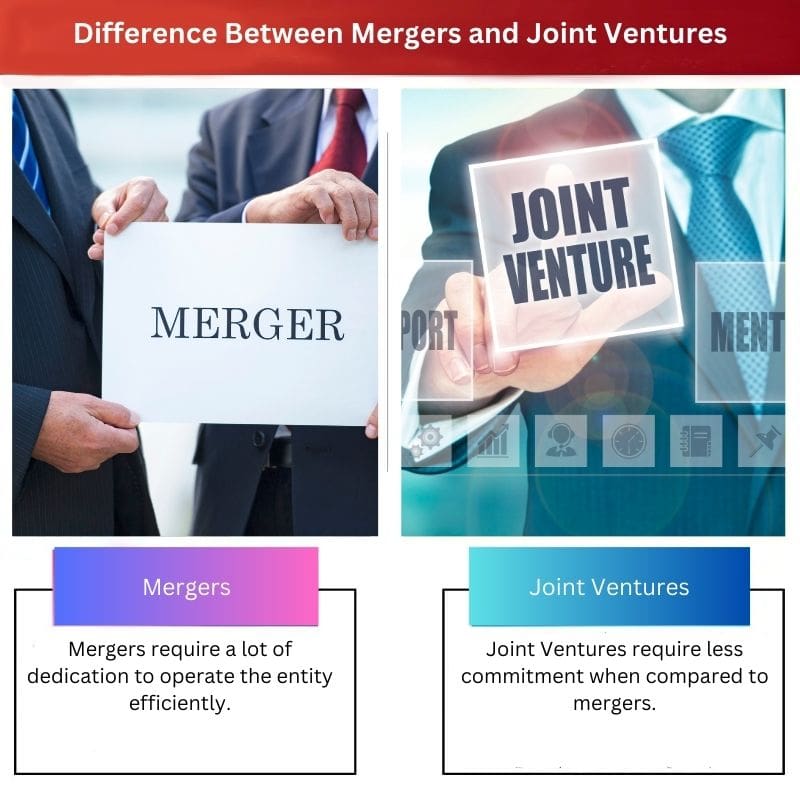Two terms in corporate business and finance are prevalent and familiar if you want to expand your business or gain advantages, technical resources, and money.
Mergers and Joint Ventures are the terms that help to grow the business successfully, and often, these terms are confused with one other.
Key Takeaways
- A merger combines two or more companies into a single entity. A joint venture is a business agreement between two or more companies to work together on a specific project or goal.
- Mergers involve the transfer of ownership from one company to another, while joint ventures involve sharing resources and risks between companies.
- Mergers create a new company, while joint ventures allow the participating companies to retain their identities.
Mergers vs. Joint Ventures
Mergers involve the combination of two or more companies into a single entity. In a merger, the companies involved agree to combine their assets, liabilities, and operations into a new company. Joint ventures involve two or more companies working together on a specific project or venture. In a joint venture, the companies involved maintain their separate legal identities.

Mergers mean when two companies of the same size join together to form one. Both companies surrender their stocks to function as one.
A Joint Venture has shared ownership where two companies are owners simultaneously and share profits, returns, risks, and governance.
Comparison Table
| Parameters of Comparison | Mergers | Joint Ventures |
|---|---|---|
| Commitment | Mergers require a lot of dedication to operate the entity efficiently. | Joint Ventures require less commitment when compared to mergers. |
| Term | Mergers are for long periods. | Joint Ventures are for the short term and are formed for fast projects. |
| Ownership | In a merger, ownership of a new entity lies with both the companies’ owners. | In a joint venture, ownership is owned by the company that started it. |
| Scope | Mergers have a more extensive range to grow. | Joint ventures have minimal scope to grow. |
| Motive | In mergers, the motive is to create opportunities and benefits for the company. | In a joint venture, the only motive is to reach a specific goal or objective. |
What are Mergers?
Mergers or acquisitions transfer all the units, ownerships, and entities amalgamated into one entity or business. Mergers can be very risky. Almost 50% of mergers fail, according to a study.
Whatever the result, it changes the nature of your business. Mergers happen legally, whereas an acquisition occurs when a big company takes over a small firm’s assets.
There is not much difference between mergers and acquisitions because both result in consolidating stocks and assets to form one enterprise. There can also be a reverse merger when a private company is listed publicly for a short period.
There are various types of mergers. A horizontal merger takes place when two companies are rivals to each other and share the same market. Cogeneric Mergers occur between two businesses with the same customer base.

What are Joint Ventures?
A joint venture is a term that describes ownership, risks, and profits between two companies. It happens when a company wants to acquire a new market with the help of another company. It is for a short period.
Joint ventures happen when companies want more resources, such as knowledge or technology, far from an individual entity.
Joint ventures involve a dark side, like adverse outcomes and unethical behaviors by companies and organizations with evil intentions. In India, there are no separate laws regarding Joint ventures, and it is treated at par with domestic companies only.

Main Differences Between Mergers and Joint Ventures
- Mergers have a larger scope to grow. Joint ventures have minimal scope to grow.
- In mergers, the motive is to create opportunities and benefits for the company. In joint ventures, the only motive is to reach a certain goal or an objective.





